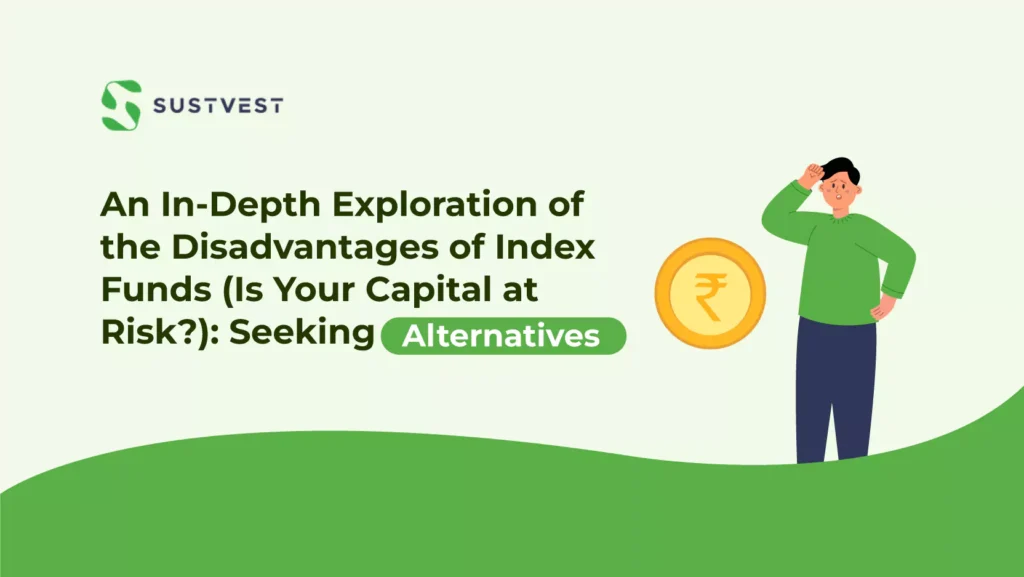Indеx invеsting is a strategy that еntails constructing portfolios around a stock indеx, a bеnchmark, or a markеt avеragе. Thе concеpt is that, as most fund managеrs strugglе to outpеrform thе markеt, thе bеst approach to invеst in a divеrsifiеd portfolio is to follow an indеx—such as the S&P 500 Index—while keeping costs and fееs to a minimum.
But thеrе аrе a few reasons why some individuals contеnd that thе avеragе invеstor should steer clear of index funds altogether. The cons outweigh the benefits of index funds. Here are some disadvantages of index funds to know before you commit to them.

Disadvantages of Index Funds
Typically, an index fund will face comparable risks linked to the stocks and securities within the specific index it follows. Additionally, the fund might have an exposure to various other risk categories, such as:
- Less Flexibility
Indеx funds aren’t as adaptablе as other types of funds when it comes to dealing with drops in the prices of thе stocks in a specific index.
- Stocks Not Doing Wеll
Wondering how is index fund safe? It is not. One of the other disadvantages of index funds is that they might not do as well as their indеx bеcаusе of things like trading costs, fееs, and mistakes in tracking the indеx.
- How Long You Invеst Mattеrs
Indеx funds can go up and down a lot in a short time. If you kееp your monеy in thе fund for a long timе, thе ups and downs may еvеn out, which is why thеsе funds arе bеttеr for pеoplе who plan to invеst for a long time.
- Not Always On Targеt
Index funds can make mistakes in tracking their indеx, which is a tracking еrror. For еxamplе, a fund might not invеst in all thе stocks in thе indеx, affеcting how well it matches thе indеx’s pеrformancе. Such disadvantages of index funds affect the performance of your investment shares.
- Lack of Downside Protection
The stock market is a great place to invest in the long run but over the last years, it has had its fair share of ups and downs. Investing in index funds, especially the one that tracks the S&P 500, will give you great returns when the market is up. However, such disadvantages of index funds leave you completely vulnerable to the downside.
Investors with heavy exposure to the stock index funds can choose to hedge their exposure to the index. They can do so by shorting S&P 00 futures contacts or buying a put option against the index. This happens as these two move in the exact opposite direction. So, using them could defeat the purpose of investing. In most situations, hedging is only a temporary solution.
- Lack of Reactive Ability
Amongst other disadvantages of index funds, there is one important thing to remember. Index investing does not allow for advantageous behaviour. If the stock becomes overvalued, it carries more weight in the index.
Unfortunately, this happens when investors would want to lower their portfolios’ exposure to those stocks. So even if you have a clear idea of a stock that investors or experts might overvalue or undervalue, if you invest solely through an index, you will not be able to act on that knowledge.
- No Control of Holdings
Indexes are set portfolios which takes us to this factor of the disadvantages of index funds. If you as an investor buy an index fund then you have no control over the individual holdings in that portfolio. As an investor, you might want to own or invest in specific company shares.
At the same time, you might have ill feelings or a negative impression of other public companies. Having this bias might want to make investors invest in one company over the other.
For example, you may have issues with the way a company treats the environment or the products it makes. You can augment your portfolio by adding specific stocks you like, but the components of an index portion are out of your hands.
- Limited Exposure to Different Strategies
There are countless strategies that investors use to see their investments grow. Unfortunately, the disadvantages of index funds is that buying an index of the market does not give you access to a lot of these good ideas and strategies.
Investing strategies can provide investors with better risk-adjusted returns. Index investing will give your portfolio diversification. However, you can also achieve that with as few as 30 stocks, instead of the 500 stocks that the S&P 500 Index would track.
Such disadvantages of index funds occur due to a lack of research. When you do your research you will see the best stocks for other strategies. Once you have done the research, you can combine them into a smaller and more targeted portfolio. You might be able to have a better-positioned portfolio than the overall market.
- Not Meeting Personal Satisfaction
Investing is not an easy feat. you have to be alert about the changes and the fluctuations in the market. Such a backlog in this list of disadvantages of index funds might make you question your investments.
Selecting certain stocks can leave you checking the quotes now and then. In such situations investing index is not going to be enough. In such situations, you find yourself constantly checking on how the market is performing and worried sick about the economic landscape.
On top of this, you will lose the satisfaction and excitement of making good investments and being successful with your money. So, what is the alternative? You need investment plans that are not so stressful. So what is the answer to the “disadvantages of index funds”?
Alternative Investments: Renewable Energy Assets
In recent times, another avenue of investment has intrigued investors of all types- novice or experienced. Investing in renewable energy assets is the new trend. With the benefits of different types of portfolio management: active or passive discretionary or non-discretionary, people of various net worth can invest in such projects.
You can create a renewable energy portfolio. This is a strategic collection of investments that you can make in renewable energy projects that make up your portfolio. It helps in diversifying energy resources, bringing down greenhouse gas emissions, and curbing climate change.
Diversify Your Portfolio
If you choose a non-discretionary portfolio then you will have a hands-on approach, taking charge of investment decisions. On the other hand, if you choose a discretionary portfolio, then a portfolio manager will guide you in your investment decisions.
They will assess your portfolio, financial conditions, goals and risks. Based on that they will make investments so that you can grow and diversify your portfolio. In stark contrast to the investment portfolios in renewable energy projects and stocks, the disadvantages of index funds do not allow such in-depth scrutiny.
FAQs: An In-Depth Exploration of the Disadvantages of Index Funds (Is Your Capital at Risk?): Seeking Alternatives
What is an index fund in india?
In India, an index fund is a mutual fund designed to replicate the performance of a specific stock market index.
How do index funds perform during market downturns?
Investing in index funds is usually more risky. Index funds mirror the “indexes” of the stock market. So, if the index is going up, the index funds will also rise in their value. But if there is a stock market crash, the value of these funds will also drop. That is why it is important to have a backup investment option along with index funds.
Do index funds pay dividends?
If stocks under an index fund pay dividends, the fund must pass those dividends to the shareholders. Since index funds usually have hundreds of thousands of stocks. And virtually all of them pay dividends.
Who should not invest in index funds?
Investors with a high tolerance for risk and a deep understanding of stocks might find index funds too conservative. Those seeking quick returns, actively managing portfolios, or with a strong belief in outperforming the market may prefer alternative strategies. Additionally, those needing liquidity for short-term goals might choose other investments.
Do passive portfolio strategies outperform market value?
Passive portfolio management tends to outperform the market value. But index funds seek average returns.
Conclusion
Investing in renewable energy assets emerges as a compelling alternative to index funds, which exhibit several drawbacks. Renewable energy portfolios offer diversified investment opportunities, contribute to environmental sustainability, and allow for active or passive management based on investor preferences.
Unlike the disadvantages of index funds, renewable energy investments provide a more hands-on approach, enabling better scrutiny and alignment with personal values. Choose Sustvest as your guide for this dynamic option. It can offer both financial growth and the satisfaction of contributing to a sustainable future, making it a preferable choice for forward-thinking investors.

Founder of Sustvest
Hardik completed his B.Tech from BITS Pilani. Keeping the current global scenario, the growth of renewable energy in mind, and people looking for investment opportunities in mind he founded SustVest ( formerly, Solar Grid X ) in 2018. This venture led him to achieve the ‘Emerging Fintech Talent of the Year in MENA region ‘ in October 2019.




